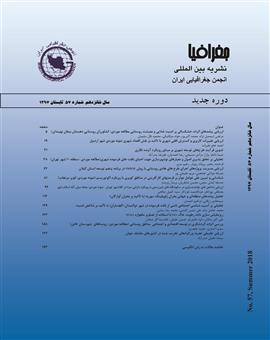ارزیابی مدیریت پروژه های اجرای طرحهای هادی روستایی با روش PMBOK در برنامه پنجم توسعه استان گیلان
محورهای موضوعی :
نصرالله مولائی هشجین
1
![]() ,
مریم علینقی پور
2
,
مریم علینقی پور
2
1 - دانشگاه ازاداسلامی واحد رشت
2 - دانشگاه آزاد اسلامی واحد رشت
کلید واژه: مدیریت پروژه, اجرای طرح هادی, PMBOK , استان گیلان,
چکیده مقاله :
شناسايي و بهره برداري از ساز وكارهاي مناسب و مؤثر مديريت دانش، يكي از دغدغه هاي جدي سازمانهاي عصر حاضر می باشد و در اين ميان، سازمانهاي پروژه محور مانند بنیاد مسکن انقلاب اسلامی به دليل موقتي بودن پروژه هاي خود و چالش مستمر زمان و منابع محدود، بيش از ساير سازمان ها به مديريت نظام مند دانش نياز دارند. تحقیق حاضر به دنبال ارزیابی کیفی پروژه های اجرای طرح های هادی استان گیلان در برنامه پنجم توسعه به وسیله استانداردهای مدیریت پروژه است تا دانشی برای تصمیم گیری های بهتر در آینده فراهم آید. در این استاندارد حوزه های دانش مدیریت پروژه در ۹ حوزه و 42 مولفه طبقه بندی شده است که شامل مدیریت یکپارچگی پروژه، مدیریت محدوده، مدیریت زمان، مدیریت هزینه، مدیریت کیفیت، مدیریت منابع انسانی، مدیریت ارتباطات، مدیریت ریسک و مدیریت تدارکات می باشد. نتایج تحقیق نشان میدهد مدیریت یکپارچگی پروژه با بالاترین میانگین با اهمیت ترین و مدیریت ریسک پروژه با کمترین میانگین از کم اهمیت ترین حوزه ها بوده، مدیریت هزینه با کمترین انحراف نسبی در بهترین وضعیت و مدیریت ریسک با بیشترین انحراف نسبی در بدترین وضعیت خود قرار داشته و در اولویت اول برای تغییر می باشد در پایان میزان همبستگی حوزه های مختلف سنجیده شده تا بتوان پیامدهای مثبت یا منفی بهتر یا بدتر شدن هر حوزه را پیش بینی نمود .
Identification and exploitation of appropriate and effective mechanisms of knowledge management is one of the most serious concerns of organizations in the present era, and in this regard, the project-based organizations, such as Islamic Revolution Housing Foundation need systematic management of knowledge more than other organizations, because of tentativeness of their project and the ongoing challenge of limited time and resources. The present study sought to qualify the evaluation of implementation of projects of rural guide plans in Guilan Province in the Fifth Development Plan by the standards of project management to provide a knowledge for making better decisions in the future. In this standard, the project management knowledge areas have been categorized in 9 areas and 42 components including project integration management, scope management, time management, cost management, quality management, human resources management, communication management, risk management and logistics management. The results showed that integration management of project and project risk management were respectively the most and least important regions with the highest and lowest average. Furthermore, the cost management and the risk management were respectively at the best and worst situations with the lowest and highest relative deviation. The latter was in the first priority to be changed. In the end, the correlation between different areas was measured to be able to predict the positive or negative consequences of every area to be better or worse.
